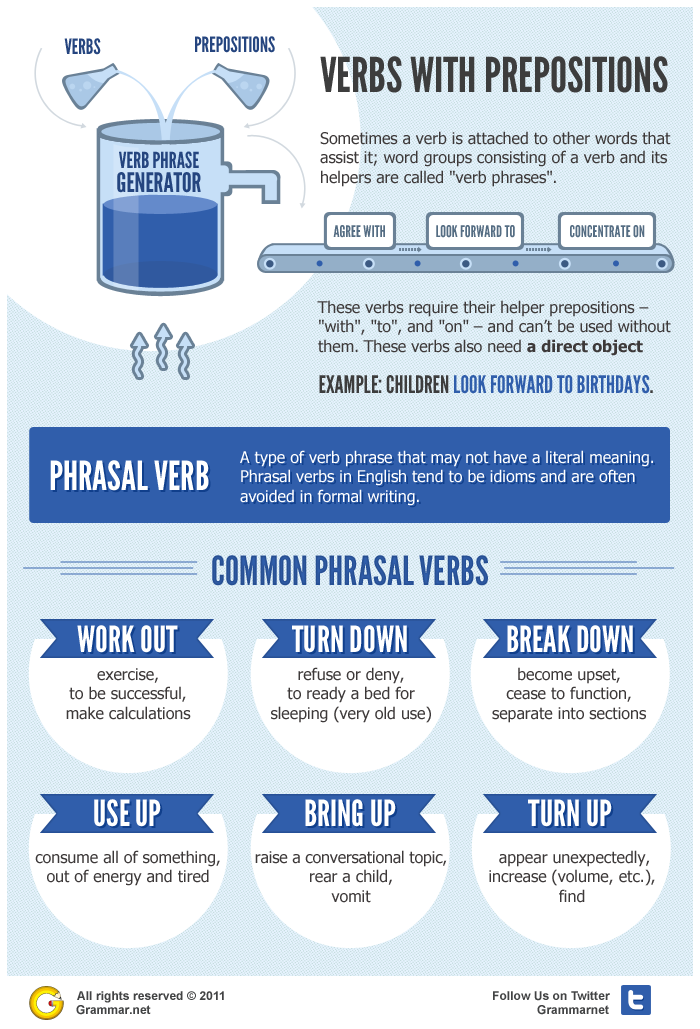In today’s post, I’d like to share with you this inforgraphic by Grammar.net to introduce verbs + prepositions and those ‘dreaded’ phrasal verbs!
Take a look at this:

[Infographic provided by Grammar.net]
Are you familiar with these phrasal verbs and those verb + preposition combinations or verb phrases?
Verb Phrases
Here are some example sentences for those verb phrases:
agree with – “I have to agree with Martin on this one. If we don’t act fast, we will lose the contract”.
look forward to – “I look forward to meeting your family next week” (following verb in the +ing form )
“I am looking forward to my holiday next week” (noun)
concentrate on – “Could I have some quiet, please? I need to concentrate on this email.” (noun)
“I am finding it really hard to concentrate on writing this draft contract”. (following verb in the +ing form )
Phrasal Verbs
And now for some example sentences for the phrasal verbs. The infographic gives you some of the different meanings of each phrasal verb. I have decided to add more meanings to some of the phrasal verbs so that you can see the variety of ways these phrasal verbs can be used.
work out
I hope you found this post helpful.

[Infographic provided by Grammar.net]
Are you familiar with these phrasal verbs and those verb + preposition combinations or verb phrases?
Verb Phrases
Here are some example sentences for those verb phrases:
agree with – “I have to agree with Martin on this one. If we don’t act fast, we will lose the contract”.
look forward to – “I look forward to meeting your family next week” (following verb in the +ing form )
“I am looking forward to my holiday next week” (noun)
concentrate on – “Could I have some quiet, please? I need to concentrate on this email.” (noun)
“I am finding it really hard to concentrate on writing this draft contract”. (following verb in the +ing form )
Phrasal Verbs
And now for some example sentences for the phrasal verbs. The infographic gives you some of the different meanings of each phrasal verb. I have decided to add more meanings to some of the phrasal verbs so that you can see the variety of ways these phrasal verbs can be used.
work out
- to solve a problem by considering the facts – “I can’t work out what to do with this situation.
- to solve a problem by doing a calculation – “I was born in 1956, you work out my age”.
- to exercise – “I love working out in the mornings”.
- to be successful - “I am sure that everything will work out in the end”.
- to decide or agree on something – ” We have worked out when to start our course”.
- used for saying what the actual cost or value is when you calculate it – “Taking the Eurostar works out more expensive than travelling with EasyJet”.
- to refuse – “She turned down their job offer”
- to reduce the volume - “Can you turn down the TV, please?”
- to ready the bed for sleeping - “Sir, would you like me to turn down the beds?” (This is an old use of the expression but you can still hear it in 5-star or 6-star hotels where this service is still offered)
- cease to function - “The washing machine has broken down again”.
- separate into sections – ” The task can be broken down in smaller, manageable sections”.
- relationships or discussion - “The Economic Talks in Beijing broke down after two days”.
- become upset, especially in public – “People broke down and cried when they heard the news”.
- make a door or wall fall - “The police had to break down the door in order to enter the flat”.
- to consume all of something - “Have you used up all the eggs?”
(NB: I have never heard of the other example of the use of this phrasal verb as shown in the infographic)
- a topic of conversation – “OK, everyone. I’d like to bring up the topic of waste disposal”.
- raise a child (often used in the passive voice)- “We were brought up to respect our elders”.
- vomit - “During the car journey, she brought up all her lunch! It was disgusting!”
- increase power/sound – “It’s so hot in here. Could you please turn up the air conditioning?”
- arrive (often unexpectedly or with no prior arrangement) – “Look who just turned up?” ”You don’t have to make a reservation. You can just turn up”.
- to find (by accident) – “Hey, look what just turned up? I have been looking for these documents everywhere”.
- to happen unexpectedly- “Don’t worry. Another job offer will turn up when you least expect it”.
I hope you found this post helpful.
Thanks Julia.
ReplyDeleteIf you have end of your private lessons assignments, expect to be more busy than usual at this time, and to need more time to work alone for longer stretches of time. Take note of what else is happening in your life at that time.
ReplyDeleteUseful Kerry thanks
ReplyDelete